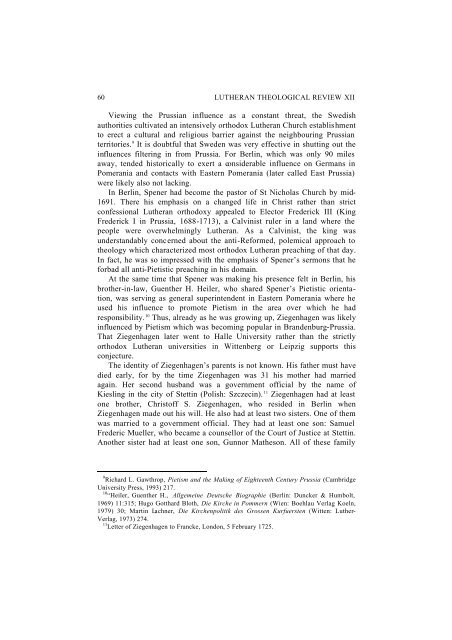LUTHERAN THEOLOGICAL REVIEW - Concordia Lutheran Seminary
LUTHERAN THEOLOGICAL REVIEW - Concordia Lutheran Seminary
LUTHERAN THEOLOGICAL REVIEW - Concordia Lutheran Seminary
You also want an ePaper? Increase the reach of your titles
YUMPU automatically turns print PDFs into web optimized ePapers that Google loves.
60 <strong>LUTHERAN</strong> <strong>THEOLOGICAL</strong> <strong>REVIEW</strong> XII<br />
Viewing the Prussian influence as a constant threat, the Swedish<br />
authorities cultivated an intensively orthodox <strong>Lutheran</strong> Church establishment<br />
to erect a cultural and religious barrier against the neighbouring Prussian<br />
territories. 9 It is doubtful that Sweden was very effective in shutting out the<br />
influences filtering in from Prussia. For Berlin, which was only 90 miles<br />
away, tended historically to exert a considerable influence on Germans in<br />
Pomerania and contacts with Eastern Pomerania (later called East Prussia)<br />
were likely also not lacking.<br />
In Berlin, Spener had become the pastor of St Nicholas Church by mid-<br />
1691. There his emphasis on a changed life in Christ rather than strict<br />
confessional <strong>Lutheran</strong> orthodoxy appealed to Elector Frederick III (King<br />
Frederick I in Prussia, 1688-1713), a Calvinist ruler in a land where the<br />
people were overwhelmingly <strong>Lutheran</strong>. As a Calvinist, the king was<br />
understandably concerned about the anti-Reformed, polemical approach to<br />
theology which characterized most orthodox <strong>Lutheran</strong> preaching of that day.<br />
In fact, he was so impressed with the emphasis of Spener’s sermons that he<br />
forbad all anti-Pietistic preaching in his domain.<br />
At the same time that Spener was making his presence felt in Berlin, his<br />
brother-in-law, Guenther H. Heiler, who shared Spener’s Pietistic orientation,<br />
was serving as general superintendent in Eastern Pomerania where he<br />
used his influence to promote Pietism in the area over which he had<br />
responsibility. 10 Thus, already as he was growing up, Ziegenhagen was likely<br />
influenced by Pietism which was becoming popular in Brandenburg-Prussia.<br />
That Ziegenhagen later went to Halle University rather than the strictly<br />
orthodox <strong>Lutheran</strong> universities in Wittenberg or Leipzig supports this<br />
conjecture.<br />
The identity of Ziegenhagen’s parents is not known. His father must have<br />
died early, for by the time Ziegenhagen was 31 his mother had married<br />
again. Her second husband was a government official by the name of<br />
Kiesling in the city of Stettin (Polish: Szczecin). 11 Ziegenhagen had at least<br />
one brother, Christoff S. Ziegenhagen, who resided in Berlin when<br />
Ziegenhagen made out his will. He also had at least two sisters. One of them<br />
was married to a government official. They had at least one son: Samuel<br />
Frederic Mueller, who became a counsellor of the Court of Justice at Stettin.<br />
Another sister had at least one son, Gunnor Matheson. All of these family<br />
9<br />
Richard L. Gawthrop, Pietism and the Making of Eighteenth Century Prussia (Cambridge<br />
University Press, 1993) 217.<br />
10<br />
“Heiler, Guenther H., Allgemeine Deutsche Biographie (Berlin: Duncker & Humbolt,<br />
1969) 11:315; Hugo Gotthard Bloth, Die Kirche in Pommern (Wien: Boehlau Verlag Koeln,<br />
1979) 30; Martin Lachner, Die Kirchenpolitik des Grossen Kurfuersten (Witten: Luther-<br />
Verlag, 1973) 274.<br />
11<br />
Letter of Ziegenhagen to Francke, London, 5 February 1725.













